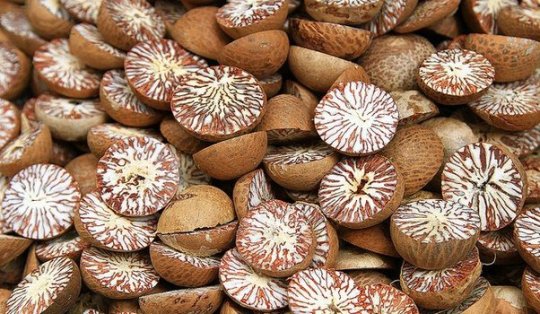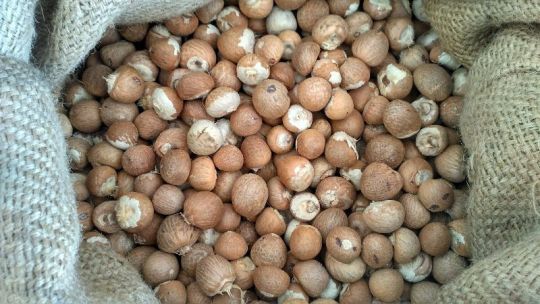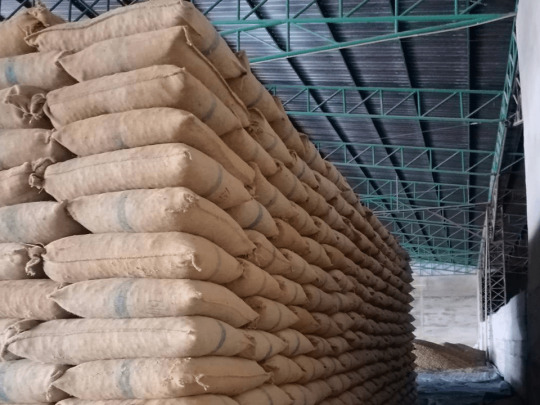#buy betel nuts responsibly
Explore tagged Tumblr posts
Text
The Secret to Buying Betel Nuts That Don't Harm People or the Planet
Fair trade is a movement that promotes social justice and environmental protection in the global trading system. Fair trade betel nut exporters are committed to paying farmers a fair price for their nuts and ensuring that they have safe and healthy working conditions. Fair trade exporters also support sustainable farming practices and community development projects.
Why choose fair trade betel nuts?

There are a number of reasons to choose fair trade betel nuts:
Support farmers: Fair trade exporters pay farmers a fair price for their nuts, which helps them to earn a living income. This can help to reduce poverty and improve the lives of farmers and their families.
Improve working conditions: Fair trade exporters ensure that farmers and workers have safe and healthy working conditions. This includes things like providing adequate safety gear and breaks, and prohibiting child labor and forced labor.
Promote sustainable farming: Fair trade exporters support sustainable farming practices that protect the environment. This includes things like using organic methods, planting trees, and conserving water.
Support community development: Fair trade exporters support community development projects in the communities where they source their betel nuts. This can help to improve access to education, healthcare, and other essential services.
How to find fair trade betel nut exporters
There are a number of ways to find fair trade betel nut exporters:
Look for the Fairtrade International logo: The Fairtrade International logo is a certification that ensures that products have been produced in accordance with fair trade principles. You can find fair trade betel nut exporters by looking for the Fairtrade International logo on product packaging.
Ask your local retailer: Many retailers now stock fair trade products. You can ask your local retailer if they sell fair trade betel nuts.
Buy online: There are a number of online retailers that sell fair trade betel nuts. You can search for fair trade betel nut exporters online using a search engine such as Google.
Examples of fair trade betel nut exporters
Here are some examples of fair trade betel nut exporters:
Indonesia: PT. XYZ, CV. ABC, PT. DEF, CV. GHI, PT. JKL
India: M/s. ABCD, M/s. EFGH, M/s. IJKL, M/s. MNOP, M/s. PQRS
Sri Lanka: AKEN LANKA PVT LTD., ASHOK LANKA EXPORTS, BALAJI VENTURES LANKA PVT LTD., BESPICE PVT LTD., BEST DEAL EXPORTERS PVT LTD.
Thailand: Thai Betel Nut Exporters Association, Thai Chamber of Commerce, Federation of Thai Industries, Thai Food Processors Association, Thailand Rice Exporters Association
Vietnam: Vietnam Chamber of Commerce and Industry, Vietnam Food Association, Vietnam Association of Seafood Exporters and Producers, Vietnam National Coffee and Cocoa Association, Vietnam Cashew Association
Conclusion
By choosing to buy fair trade betel nuts, you can help to support farmers, workers, and communities in developing countries. You can also help to promote sustainable farming practices and protect the environment.
Fairtrade International is a non-profit organization that certifies products that have been produced in accordance with fair trade principles.
#fair trade betel nut exporters#ethical betel nuts#sustainable betel nuts#buy betel nuts responsibly#guilt-free betel nuts
0 notes
Text
Areca Nut Market Dynamics, Forecast, Analysis and Supply Demand 2017 - 2027
Areca Nut Market Overview: Areca nut is the fruit produced from the palm trees of South East Asia. Although, the production of areca nut is dependent on the geographic and climatic conditions of the region. Thus, the price fluctuations are majorly dependent on the production of the areca nut. The areca nuts are consumed not only for chewing with betel leaf, but also for various rituals in South East Asia Pacific countries. India is the largest consumer and producer of areca nut in the world. As high consumption of areca nut causes severe health problems, the market for areca nut has attained maturity in the global market.
Request Sample Report @ https://www.futuremarketinsights.com/reports/sample/rep-gb-6070
Areca Nut Market Dynamics:/p>
Areca nut is majorly influenced by weather conditions in the production rea, government policies, the growth of consumer industries, government olicies for consumer industries and a few others. The regular consumption of reca nut causes severe diseases such as throat cancer and mouth cancer. ue o a significant number of people affected by the consumption of areca nut, he ndian and several governments have posed various regulations over the reca ut production and consumer industries. This fact has restrained the market for reca nut. Also, the increasing awareness among people regarding healthy life tyle and severe effects of areca nut have resulted into a barrier for areca nut arket. As the pre-bearing age of the palm trees is between 5 to 8 years, and nly 5% of them result into seed set, the cultivation of areca nut consumes a ot f time. The time required for cultivation of areca nut and required nvironmental conditions such as minimum 70% humidity restrains the market t the supplier end.
Areca Nut Market Segmentation:/p>
The areca nut market can be segmented on the basis of reca ut processing as
Chali (ripe sun-dried nuts)
li>Red boiled tender or mature nuts)
The areca nut market can be segmented on he basis of various regional varieties of the areca nut as
Indian arieties
Non-Indian varieties
South Kanaka (South Kanara, Karnataka)
Thirthahali Maland, Karnataka)
Rotha (Costal Maharastra)
Mettupalayam Mettupalayam, Tamil Nadu)
Kahikuchi (North East India)
Mohitnagar (West Bengal)
/ul>
Mangala (China)
Sumangala (Indonesia)
Sree Mangala Singapore)
Others
Areca Nut Market egional Outlook:
The Asia Pacific is the largest market of reca nuts in the world, with more than 90% of the global market share. India s he largest producer, as well as consumer of areca nut. India is responsible for ore than half of the global production of areca nut and still imports various erities from other countries in large volume.
The major export estinations of India includes several Asia Pacific countries, along with a small hare of U.A.E., U.S. and U.K. Due to relaxation offered by the Indian vernment on the import duty, the import of areca nut from Bangladesh has rown to around three times. India, Bangladesh, Indonesia, Thailand, Sri anka nd Myanmar, all together are responsible for serving the almost complete emand for areca nut. The Asia Pacific market of areca nut is well established, hile several government regulations and awareness among people have esulted in the maturity of the market. MEA region, especially Sub-Saharan frica provides a small market to the areca nuts. All the facts and figures tated bove indicate a concentrated market of areca nut in South East Asia Pacific ountries, while a weak market in other regions of the globe.
strong>Buy This Report@ https://www.futurearketinsights.com/checkout/6070
Areca Nut arket Key Players:
Some of the key players in the areca nut arket are
GM group
Surya Exim
K. TRADING
Biotan Pharma
Shri Ganesh Prasad Traders
Marlene raders Co., Ltd.
Viet D.E.L.T.A Industrial Co., Ltd
0 notes
Text
Buy Betel Nuts Without Guilt: A Guide to Sustainable Exporters

Betel nuts, also known as areca nuts, are a popular chewable stimulant in many parts of Asia. They are typically wrapped in a betel leaf with lime paste and other ingredients, and chewed for their stimulating and euphoric effects. Betel nuts are also used in some traditional medicines and religious ceremonies.
However, the production and consumption of betel nuts has been associated with a number of environmental and social problems, including:
Deforestation: Betel nut palms are often grown on cleared forest land, which can contribute to deforestation.
Water pollution: The processing of betel nuts can generate wastewater that is contaminated with pesticides and other pollutants.
Child labor: Child labor is sometimes used in the harvesting and processing of betel nuts.
Health risks: Betel nut chewing is associated with a number of health risks, including oral cancer and cardiovascular disease.
Sustainable betel nut exporters are committed to minimizing the environmental and social impacts of their operations. They may use sustainable farming practices, such as agroforestry and organic farming. They may also work to improve the working conditions of their employees and provide support to their communities.

If you are looking to buy betel nuts in a responsible way, it is important to choose a sustainable betel nut exporter. Here are some tips for finding sustainable betel nut exporters:
Look for certifications: There are a number of certifications that can help you to identify sustainable betel nut exporters. Some of these certifications include:
Fairtrade International
Rainforest Alliance
Organic certification
Do your research: Ask the exporter about their sustainable practices. Find out how they source their betel nuts, how they process them, and how they support their employees and communities.
Buy from local exporters: Buying from local exporters can help to reduce the environmental impact of transportation.
Here are some examples of sustainable betel nut exporters:
Indonesia: PT. XYZ, CV. ABC, PT. DEF, CV. GHI, PT. JKL
India: M/s. ABCD, M/s. EFGH, M/s. IJKL, M/s. MNOP, M/s. PQRS
Sri Lanka: AKEN LANKA PVT LTD., ASHOK LANKA EXPORTS, BALAJI VENTURES LANKA PVT LTD., BESPICE PVT LTD., BEST DEAL EXPORTERS PVT LTD.
Thailand: Thai Betel Nut Exporters Association, Thai Chamber of Commerce, Federation of Thai Industries, Thai Food Processors Association, Thailand Rice Exporters Association
Vietnam: Vietnam Chamber of Commerce and Industry, Vietnam Food Association, Vietnam Association of Seafood Exporters and Producers, Vietnam National Coffee and Cocoa Association, Vietnam Cashew Association
Please note that this is just a small sample of sustainable betel nut exporters around the world. There may be other exporters that meet your sustainability criteria.
By choosing to buy betel nuts from sustainable exporters, you can help to reduce the environmental and social impacts of the betel nut industry. You can also support betel nut farmers and communities that are working to build a more sustainable future.
#sustainable betel nut exporters#buy betel nuts responsibly#ethical betel nut exporters#sustainable agriculture#child labor-free betel nuts
0 notes
Text
Best alternative in buying a farmland in Konkan
1)100 Acers Club member. (Hundred Acres Farm Club ):-
Kokanbag the green dream we saw about 10 years ago by the Navjeevan team! When we dreamed, there wasn't even an acre of land under our feet. Today, after almost 10 years, we have come to around 5 acres. We have 11 members. Our members from Thane, Bhopal, Pune, Mumbai as well as some foreign countries like Singapore, Denmark and Dubai, showed faith in our Navjeevan team and bought land from us and took membership of our Kokanbag.
You too can be a member of our Hundred Acres Club. We plan to purchase at least half an acre to a maximum of two acres or land according to your budget and entrust us with all the next responsibility! Today, those who bought us farms had their fields blossomed, flourished, and now Kokanbag is in shape! You too can become a member of our Kokanbag family by purchasing land. You can share your concept of farming with our able team. We have different options for buying different farmland. Think of this as our next invitation ... Come on then .... When are you going to be a member of the Hundred Acres Club?
2)Sunday Farmers Club:-
We include members of our "Sunday Farmers Club" who are unable to come to the field everyday or for a few days. The Sunday Farmers Club is a farm club for those who enjoy the farm on a Saturday or Sunday or a holiday! The villages are now closer because of the Kokan Railway. Whether it is modern high-speed rail trains like the Tejas Express or the Rajdhani Express, we can reach farms in Kokan from any corners of India within a day. (Prof. Mahesh has come to Panaji from Delhi, Ahmedabad, Amritsar, Chennai, etc. and reached his farm by evening Kokan Kanya train.)
Kokan Railway and the airlines will soon work in sync. If you can come to your farm this way within a day, spend the next two holidays on the farm, participate in all activities, participate in the activities of your farm, understand the farm and give it to the members of Sunday Farmers. We invite you to join us in this concept.
3)Spice Garden Club:-
Masalabagh Project in Kokan fertile soils
Spice farming in Kokan is actually Kerala, Madras, Tamil Nadu ....! In the Kokan soil, spices including coconut, Betel nut, Jack Fruit and Kokam also grow. It is proven that spice cultivation is a viable alternative to Kokan’s Mango, cashew nuts and rice. Dr. Balasaheb Sawant from Kokan Agriculture University has proved that Spices farming is possible in Kokan. We can cultivate Blackberry, Cinnamon, Nutmeg, Cardamom, Cloves, Coconut, Betel nut and other spices in the land that you have purchased. With your will power, patience and other natural resources, we can successfully do spice farming.
4)Family adoption of parents:-
Oldage House Needs Modern Options.
Our innovative plan is for those parents who have children or relatives in foreign countries. Foreigners, parents or a straight-blooded uncle or a parent to be in solitude at home, or for those who care about them. You buy land for your parents and relax. Our new venture that we can take care of your parents, we will take care of them, we will take care of them in Kokan fields. Our Kokanbag family is always getting inquiries, many of whom have inquired about what we can do for the parents. Your parents are welcome ot this parent adoption plan.
#buy agricultural land in konkan#agriculture land in konkan area#land purchase in konkan#land sell in konkan
0 notes